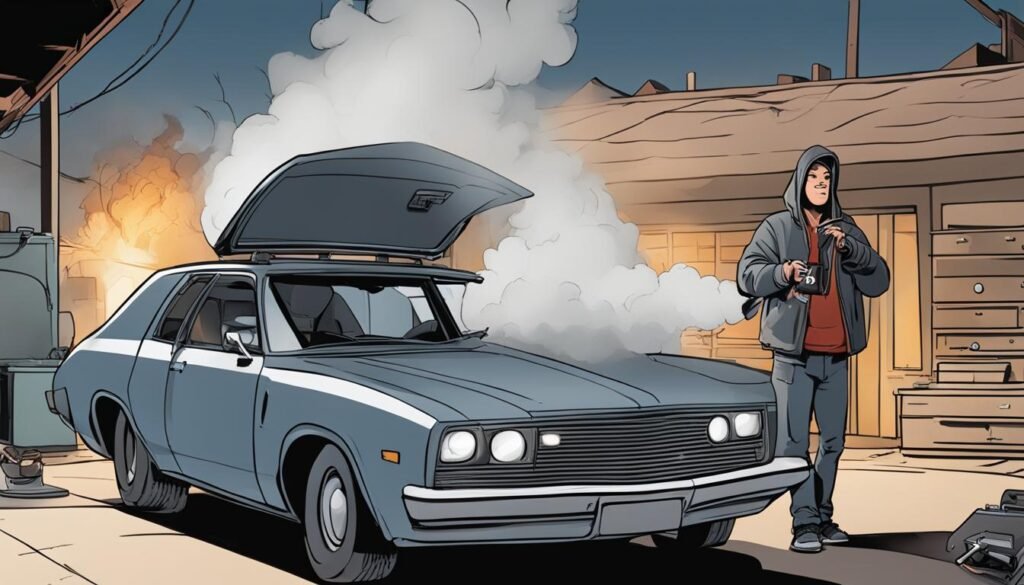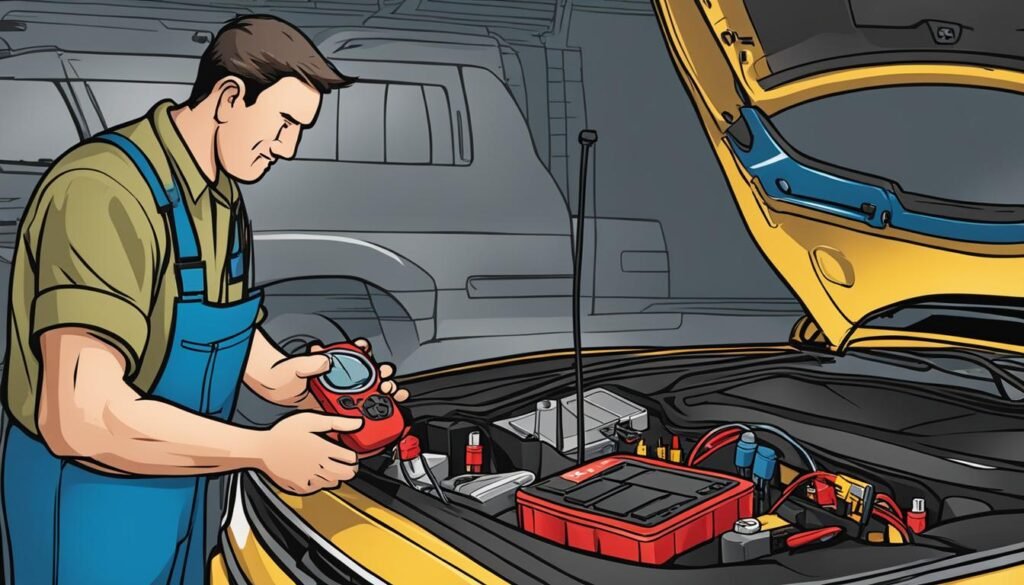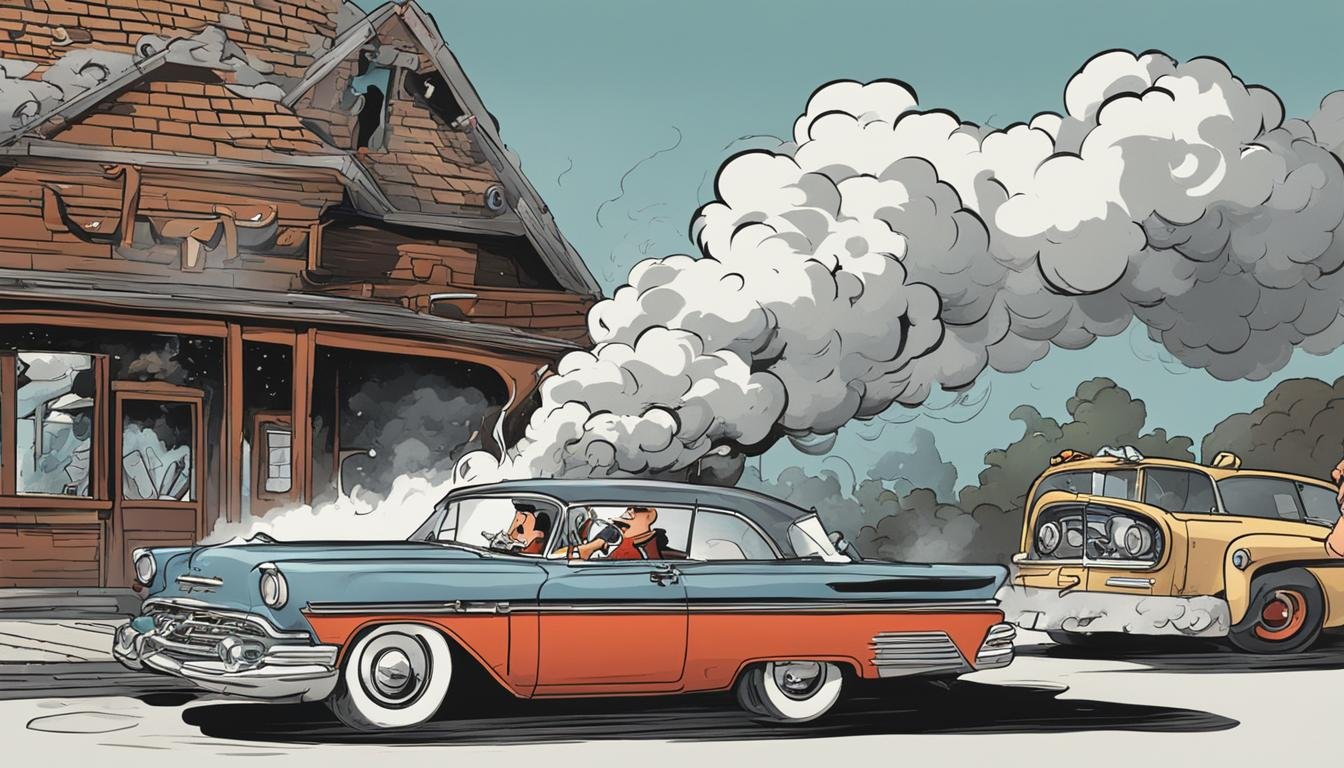If your car hesitates to start or struggles to start every time you put the key in the ignition, there can be a variety of mechanical reasons behind the issue. Some common causes include a bad starter motor, fuel pressure regulator problems, fuel delivery system issues, problems with spark plugs, and a clogged air filter. Observing the conditions when the engine hesitates to start can help diagnose the issue. Testing the fuel pressure regulator and checking for clogged fuel injectors or a dirty air filter can also be helpful in troubleshooting the problem.
Key Takeaways:
- Car hesitation to start can be caused by various mechanical issues.
- Common causes include a bad starter motor, fuel pressure regulator problems, fuel delivery system issues, problems with spark plugs, and a clogged air filter.
- Observing conditions and testing components can help diagnose the problem.
- Addressing the issue promptly can ensure a smoother starting experience.
Common Causes of Car Starting Issues
If you’ve ever experienced your car struggling to start, you know how frustrating and inconvenient it can be. There are several common causes that can lead to this issue, ranging from electrical problems to fuel delivery issues. Here are some of the most frequent culprits when it comes to car starting problems:
- A weak battery: A battery that is low on charge or nearing the end of its lifespan can result in difficulties starting your car. It may struggle to provide enough power to the starter motor to crank the engine.
- Faulty crankshaft or camshaft position sensor: These sensors are responsible for detecting the position of the engine’s crankshaft and camshaft, respectively. If they malfunction when the engine is hot, it can cause starting problems.
- Bad alternator: The alternator is responsible for charging the battery while the engine is running. If it fails, the battery may not have enough charge to start the car.
- Starter motor issues: A faulty starter motor can prevent the engine from cranking when you turn the key. This can be caused by worn-out components or electrical problems.
- Fuel filter or fuel pump problems: If the fuel filter is clogged or the fuel pump is malfunctioning, it can restrict the flow of fuel to the engine, resulting in starting difficulties.
- Malfunctioning spark plugs: Spark plugs are responsible for igniting the fuel-air mixture in the engine. If they are worn-out or faulty, it can lead to misfires and difficulties starting the car.
- Obstructed air filter: A dirty or clogged air filter can restrict airflow to the engine, affecting its ability to start smoothly.
Identifying the specific cause of your car’s starting problems is crucial in order to address the issue effectively. It may require diagnostic tests or the expertise of a professional mechanic. Don’t hesitate to seek assistance if you’re unsure about the underlying cause of your car’s starting issues.

Addressing the Problem
Once you have identified the cause of your car’s starting problems, you can take appropriate steps to address the issue. Depending on the specific component that is malfunctioning, you may need to replace or repair it. Here are some general tips to help you troubleshoot and resolve car starting issues:
- Test the battery: Use a voltmeter or visit an auto parts store for a free battery test to determine if your battery is the culprit. If it is weak or near the end of its lifespan, consider replacing it.
- Check the crankshaft and camshaft position sensors: If your car struggles to start when the engine is hot, these sensors could be the problem. Have them tested and replaced if necessary.
- Inspect the alternator: Listen for any abnormal noises during start-up and use a voltmeter to check the alternator’s charge continuity. If it’s faulty, replace it.
- Examine the starter motor: If you hear a clicking sound when you try to start your car, it could indicate a problem with the starter motor. Have it inspected and repaired or replaced as needed.
- Address fuel delivery issues: If your car has fuel filter or fuel pump problems, have them checked and replaced if necessary. This will ensure proper fuel flow to the engine.
- Replace faulty spark plugs: Worn-out or malfunctioning spark plugs can cause starting difficulties. Replace them to ensure proper ignition of the fuel-air mixture.
- Clean or replace the air filter: If your air filter is dirty or clogged, clean it or replace it to improve airflow to the engine.
By following these steps and addressing the specific cause of your car’s starting issues, you can improve its overall performance and enjoy a reliable start every time.
Diagnosing a Battery Problem
One of the most common reasons for a car to hesitate to start is a battery problem. When your car exhibits symptoms such as sluggish starting, dimming interior lights and console when cranking, a slower turning-over sound, or a clicking noise after a sluggish start, it’s likely that your battery is the culprit. It is important to test the battery to confirm whether it needs to be replaced or if there is another underlying issue causing the starting trouble.
To test the battery, you can use a voltmeter or visit an auto parts store for a free battery test. Using a voltmeter, ensure that the battery voltage is within the manufacturer’s recommended range. If the voltage is significantly lower or the battery fails the test at the auto parts store, it is a clear indication that the battery is the cause of your starting difficulties. In this case, you can replace the battery easily with basic tools and following proper installation steps.
Remember, a bad battery can not only hinder your car’s starting performance but also affect other electrical components. It is crucial to address the battery problem promptly to avoid further complications.
In addition to replacing the battery, it is important to check the battery terminals for any corrosion or loose connections. Clean the terminals using a battery terminal cleaner or a mixture of baking soda and water. Tighten any loose connections to ensure a secure electrical connection. These simple maintenance steps can help optimize your battery’s performance and prolong its lifespan.
Key Takeaways:
- Sluggish starting, dimming lights, slower turning-over sound, and clicking noise after starting are signs of a bad battery.
- Test the battery with a voltmeter or visit an auto parts store for a free battery test to confirm the issue.
- Replace the battery if it fails the test or has significantly lower voltage.
- Check battery terminals for corrosion and tighten any loose connections.
- Regular maintenance can optimize battery performance and extend its lifespan.

Troubleshooting a Bad Alternator
When your car is having trouble starting, it’s important to consider all possible causes. One common culprit that can cause a car to hesitate to start is a bad alternator. The alternator plays a crucial role in charging the battery and powering the electrical components of the vehicle. If the alternator is failing or not functioning properly, it can lead to issues with starting the car.
There are several signs that indicate a bad alternator. Dim lights, a battery warning light turning on, slow or malfunctioning accessories, trouble starting with frequent stalling, whining noises, or the smell of burning wires are all symptoms that could point to a failing alternator. It’s essential to pay attention to these warning signs and take action to address the problem.
To troubleshoot a bad alternator, there are a few steps you can take. First, listen for any clicking or grinding noises during start-up, as these can indicate a problem with the alternator. Additionally, you can use a voltmeter or multimeter to check for charge continuity. If the alternator is not producing a consistent charge, it may need to be replaced.
It’s worth noting that attempting to rebuild the alternator is not recommended. It is a complex component that requires specialized knowledge and tools to repair correctly. It’s best to replace the alternator with a new or remanufactured unit to ensure optimal performance and reliability.
Addressing Other Common Causes
Aside from battery and alternator issues, there are several other common causes that can lead to a car hesitating to start. By understanding these possibilities, you can effectively troubleshoot and resolve the problem. Here are some of the potential culprits:
- Starter motor solenoid or starter motor problems: Issues with the starter motor solenoid or the starter motor itself can prevent your car from starting smoothly. If you hear a clicking noise when you turn the key, it could indicate a faulty starter motor solenoid.
- Fuel system problems: A clogged fuel filter, a malfunctioning fuel pump, or faulty fuel injectors can disrupt the fuel flow to the engine, resulting in starting difficulties.
- Oxygen sensor malfunction: The oxygen sensor plays a crucial role in maintaining the optimal fuel-to-air ratio in the engine. A malfunctioning oxygen sensor can cause the engine to run rich or lean, leading to starting troubles.
- Faulty spark plugs: Worn or fouled spark plugs can affect the ignition system, making it harder for the engine to start. It’s important to regularly inspect and replace spark plugs as needed.
- Throttle body issues: Problems with the car’s throttle body, such as clogs or malfunctions, can disrupt the proper airflow, impacting the engine’s starting performance.
- Obstructed air filter: An obstructed air filter can restrict airflow to the engine, affecting the combustion process and causing starting difficulties.
Understanding the specific symptoms associated with these potential causes can help you pinpoint the underlying issue. Conducting proper diagnostic tests or seeking professional help is crucial to accurately identify and resolve the problem. Depending on the situation, it may be necessary to repair or replace the affected components to ensure proper starting performance.
By addressing these common causes, you can troubleshoot and resolve car starting problems effectively. Remember to consider the starter motor solenoid, fuel system, oxygen sensor, spark plugs, throttle body, and air filter when diagnosing the issue. Taking appropriate actions will enhance your car’s starting performance, ensuring a smoother and more reliable driving experience.
Conclusion
When your car hesitates to start, it can be frustrating and inconvenient. However, by understanding the common causes of car starting issues, you can troubleshoot the problem effectively and get back on the road smoothly. Whether it’s a battery problem, an issue with the alternator, or other potential culprits, taking the right steps will help you address the issue promptly.
Start by testing the battery to determine if it needs to be replaced. A weak battery can often be the main cause of car starting troubles. If the battery is not the issue, check the alternator for any signs of malfunction. A failing alternator can also hinder the car’s ability to start properly.
If neither the battery nor the alternator is the problem, consider potential issues with the fuel system, such as a clogged fuel filter or faulty fuel pump. Additionally, inspect the spark plugs, throttle body, and air filter for any obstructions or defects. These components can impact the car’s starting performance and may require repair or replacement.
By troubleshooting these common causes of car starting problems, you can improve your car’s overall performance and avoid unexpected delays. Remember to seek professional help if needed, as they have the expertise to identify and resolve complex issues. Keep your car in good condition and enjoy a smooth and reliable starting experience every time you turn the key.
FAQ
Why does my car hesitate to start?
There can be several reasons behind a car hesitating to start, including issues with the starter motor, fuel pressure regulator, fuel delivery system, spark plugs, or air filter. Observing the conditions when the engine hesitates can help diagnose the problem.
What are the common causes of car starting issues?
Some common causes of car starting issues include a weak battery, faulty crankshaft or camshaft position sensor, bad alternator, starter motor problems, fuel filter or fuel pump issues, bad fuel injectors, malfunctioning oxygen sensor, faulty spark plugs, throttle body problems, or an obstructed air filter.
How can I diagnose a battery problem?
Signs of a bad battery include sluggish starting, dimming interior lights, slower turning-over sound, and clicking noise after a sluggish start. Testing the battery with a voltmeter or getting a free battery test at an auto parts store can help determine if the battery is the issue.
How do I troubleshoot a bad alternator?
Symptoms of a bad alternator include dim lights, battery warning light turning on, malfunctioning accessories, slow accessories, trouble starting with frequent stalling, whining noises, or the smell of burning wires. Testing the alternator for clicking or grinding noises during start-up or checking for charge continuity using a voltmeter can help diagnose the problem.
What should I do about other common causes of starting issues?
Other common causes of starting issues can include problems with the starter motor solenoid, fuel filter, fuel pump, fuel injectors, oxygen sensor, spark plugs, throttle body, or a clogged air filter. Understanding the symptoms and conducting proper diagnostic tests can help determine the cause and the appropriate solution.

